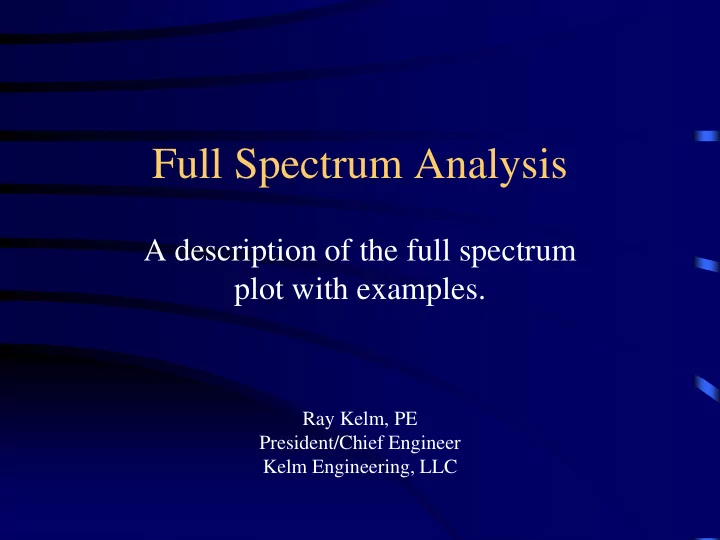

Full Spectrum Analysis A description of the full spectrum plot with examples. Ray Kelm, PE President/Chief Engineer Kelm Engineering, LLC
Time and Frequency Domain
Basic FFT Plot
Basic FFT Characteristics • 1024 time waveform points used with 400 line spectrum • 1024 time waveform numbers produces 1024 FFT numbers – 512 cosine terms – 512 sine terms • FFT has both amplitude and phase content
Basic FFT Characteristics, cont • Most FFT plots display 400 lines (for 1024 waveform points) – Units are magnitude (phase characteristics are hidden) – Lines 401 to 512 are truncated to reduce the risk of aliasing and based on history
Basic FFT Characteristics, cont • Referred to as a “half” spectrum • Displays a limited amount of data from the waveform • Is fully reversible if phase content is preserved
FFT Summary Magnitude FFT plots display 400 lines of data for a 1024 sample waveform. Internally, the FFT routine calculates 1024 frequency values including 512 sine and 512 cosine terms. The data is presented as magnitude {(sine 2 +cosine 2 ) 1/2 } and truncated from 512 frequency points to 400 to reduce the risk of viewing aliased data.
Orbit Plot Development • Using two orthogonal probes
Orbit Example
Full Spectrum Introduction • Full Spectrum plot is a sort of FFT display that is used to separate data from orthogonal pairs into “forward” and “reverse” precession
Precession Demo
Forward/Reverse Calculation
Description Conditions Comments All forward amplitude Circular orbit (figure 5) Rare perfect orbit likely due to unbalance with symmetrical bearings/supports Forward amplitude with Elliptical orbit (figure 7) Normal rotor response some backward with non-symmetric component vertical/horizontal bearing and/or support stiffness Forward and backward Orbit is a straight line Can be caused by components equal (same amplitude but with misalignment type both probes either in loading of a bearing phase or 180° out of phase) (figure 8)
Circular Orbit – Pure Forward
Elliptical Orbit – Forward/Reverse Mix
Straight Line Orbit – Forward/Reverse Equal
Recommend
More recommend